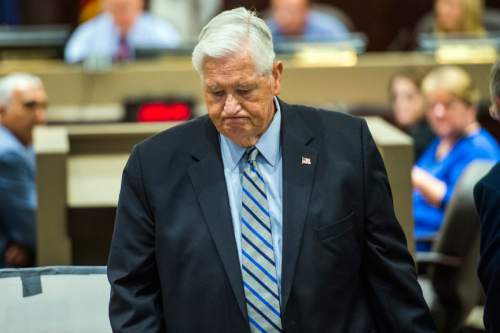This is an archived article that was published on sltrib.com in 2016, and information in the article may be outdated. It is provided only for personal research purposes and may not be reprinted.
After Utah Transit Authority officials talked at length Wednesday with legislators about their sometimes-pricey future plans, Rep. Jake Anderegg raised what he called the elephant in the room: public mistrust of the agency.
"Right now, I think there is a significant reticence to say, 'Let's go ahead and throw hundreds of millions of dollars at this [UTA planning] when we're still not sure the ship has been righted," the Lehi Republican told the Transportation Interim Committee.
He noted that Proposition 1 to boost transit taxes failed in Salt Lake and Utah counties last year, "and the main reason it didn't pass, in my mind, is this distrust." UTA has been criticized in recent years for such things as high wages, extensive international travel, closing meetings and sweetheart deals with developers.
So, Anderegg asked UTA leaders, "How do you convey to us in any meaningful way that the inner vessel is being cleansed so that we can talk about ramping up funding options?" He also warned at least two bills are being drafted to restructure the agency's board.
UTA Board Chairman H. David Burton responded, "Let me assure you that the inner vessel over the last 18 months has been painfully cleansed, all the way from the top to bottom."
Burton said many key personnel have changed, and policies have been revised to create higher ethical standards and make the agency more transparent. "It is hard to convey to the public. But it has been accomplished."
He added, "There is no question that public confidence is challenge No. 1, by a large measure. It is probably challenge No. 1, 2, 3 through 10."
Burton, who hinted Wednesday he may not be with the agency much longer, said one problem UTA faces is that "memories are extremely long. Events that took place five and six years ago are still being conjured up in the press as being current. Let me assure you they are not."
House Minority Leader Brian King, D-Salt Lake City, said a problem occurred just this year when the UTA Board decided to close its committee meetings to the public. The agency reversed course under pressure from the press, politicians and the public.
"I do have to tell you that this latest brouhaha about transparency in committee meetings was problematic, and was a black eye," King said. "And that was fairly recent."
Rep. Brad Dee, R-Ogden, raised concerns about a new proposal to spend $65 million to elevate and extend the TRAX line to Salt Lake City International Airport by a half mile to a new terminal under construction. That comes three years after the airport TRAX line opened.
"Did we know about that relocation … when we built that?" he asked. "If we did, why did we do that?"
Burton said UTA knew that terminal reconstruction was coming and that a short extension would be needed. Officials thought it would cost in the range of $5 million. As final drawings were made by the airport, the city and UTA believed it would be wise to extend and elevate the line by a half mile directly to the terminal.
Funding for the now $65 million upgrade has yet to be identified.
"It seems like the right hand should now what the left hand is doing on that," Dee said, "especially when we are working with taxpayer dollars."
King noted that Burton recently was named chairman of the University of Utah board of trustees and asked if he could do that and still oversee UTA. Burton, the former presiding bishop of The Church of Jesus Christ of Latter-day Saints, hinted he may soon leave UTA.
"My term as the governor's appointee on the UTA Board has expired. In just a few minutes, I will be meeting with the governor and I suspect some changes may be in order," he said, but added that other board members are committed to "do what is necessary" to build trust.
Anderegg also pointed to a new bus-rapid-transit project in Provo and Orem, saying he and many others fear it will not have high enough ridership to justify its price tag of $190 million (including many highway improvements).
Acting UTA President and CEO Jerry Benson said similar worries were raised about TRAX before its first line debuted, but it has proven popular. "I think we'll see the same with the Provo-Orem BRT," Benson said. Bus-rapid transit is sort of a TRAX on rubber wheels.
Perhaps underscoring the need for public trust to allow higher transit taxes or other future local funding, Benson noted that rules for federal money that helped build many recent rail lines have changed.
He said more places are competing for it, less money is available, and federal matches have dropped from 80 percent to 50 percent or less. Standards for projects have been raised, as well, in ways so that many recent UTA rail projects "would not qualify under today's rules."



